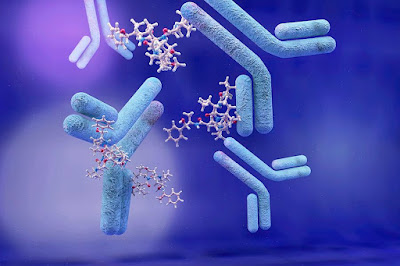Antibody Drug Conjugates Are Highly Tailored Biopharmaceutical Therapies That Combine Monoclonal Antibodies
 |
| Antibody Drug Conjugates |
ADCs, also known as Antibody Drug Conjugates are highly tailored biopharmaceutical therapies that combine monoclonal antibodies designed to target certain tumour cells' surface antigens with highly potent anticancer chemicals and are joined by chemical linkers. To put it simply, cancer cells receive "deactivated" cytotoxins from antibody-drug conjugates. The cytotoxin regains its full, cancer-killing cytotoxic effect once it has internalised the tumour cell. Cell death consequently happens swiftly.
Only a small number of the thousands of cellular poisons produced chemically or from natural sources are acceptable for use in an antibody-drug combination (ADCs). Early ADCs were developed utilising chemotherapeutic medicines that have received clinical approval, such as methotrexate and doxorubicin. One of the main factors propelling the global Antibody Drug Conjugates revenue growth is the rising geriatric population, rising incidence of various cancer types around the world, and rising government spending on pharmaceutical research and development activities for more advanced cancer drugs and therapeutics. ADCs, which help boost the ability of monoclonal antibodies to destroy cells, are typically utilised in cancer therapy. An antibody medicine, a cytotoxic chemotherapeutic agent, and a linker are the components of ADCs.
Higher tumour selectivity, reduced systemic exposure, and improved drug tolerance are further key benefits of these medications. Other significant factors propelling the global Antibody Drug Conjugates revenue growth include the emergence of advanced antibody therapies, rising preclinical research programmes, rising number of clinical trials for new cancer therapeutics, growing emphasis on new drug discovery & development by pharmaceutical companies, and rising number of clinical trials for new cancer therapeutics.
A target-associated antigen-specific antibody, an antigen with restricted expression on normal cells, a cytotoxic agent intended to kill target cancer cells, and a chemical linker to bind the cytotoxic agent to the antibody are the three components that make up an antibody drug conjugate.
The therapeutic promise of Antibody Drug Conjugates comes with both technical and developmental difficulties. The most cutting-edge type of medicinal agent nowadays is thought to be an antibody drug conjugate. They combine the power of monoclonal antibodies to target cells with the capability of cytotoxic medicines to specifically kill those cells.
Only with the rapid growth of technology is it now possible for this technique to succeed. The novel therapeutic agent class that is attracting interest from both big and small pharmaceutical businesses is Antibody Drug Conjugates. The cytotoxic drug's potency in the antibody drug combination is 100–1000 times more than its potency when it operates alone. Despite the fact that this technology gives the majority of multinational pharmaceutical corporations a presence, relatively few companies now have the capacity to create ADC
The therapeutic promise of Antibody Drug Conjugates comes with both technical and developmental difficulties. The most cutting-edge type of medicinal agent nowadays is thought to be an antibody drug conjugate. They combine the power of monoclonal antibodies to target cells with the capability of cytotoxic medicines to specifically kill those cells.
Only with the rapid growth of technology is it now possible for this technique to succeed. The novel therapeutic agent class that is attracting interest from both big and small pharmaceutical businesses is Antibody Drug Conjugates. The cytotoxic drug's potency in the antibody drug combination is 100–1000 times more than its potency when it operates alone. Despite the fact that this technology gives the majority of multinational pharmaceutical corporations a presence, relatively few companies now have the capacity to create ADC



Comments
Post a Comment